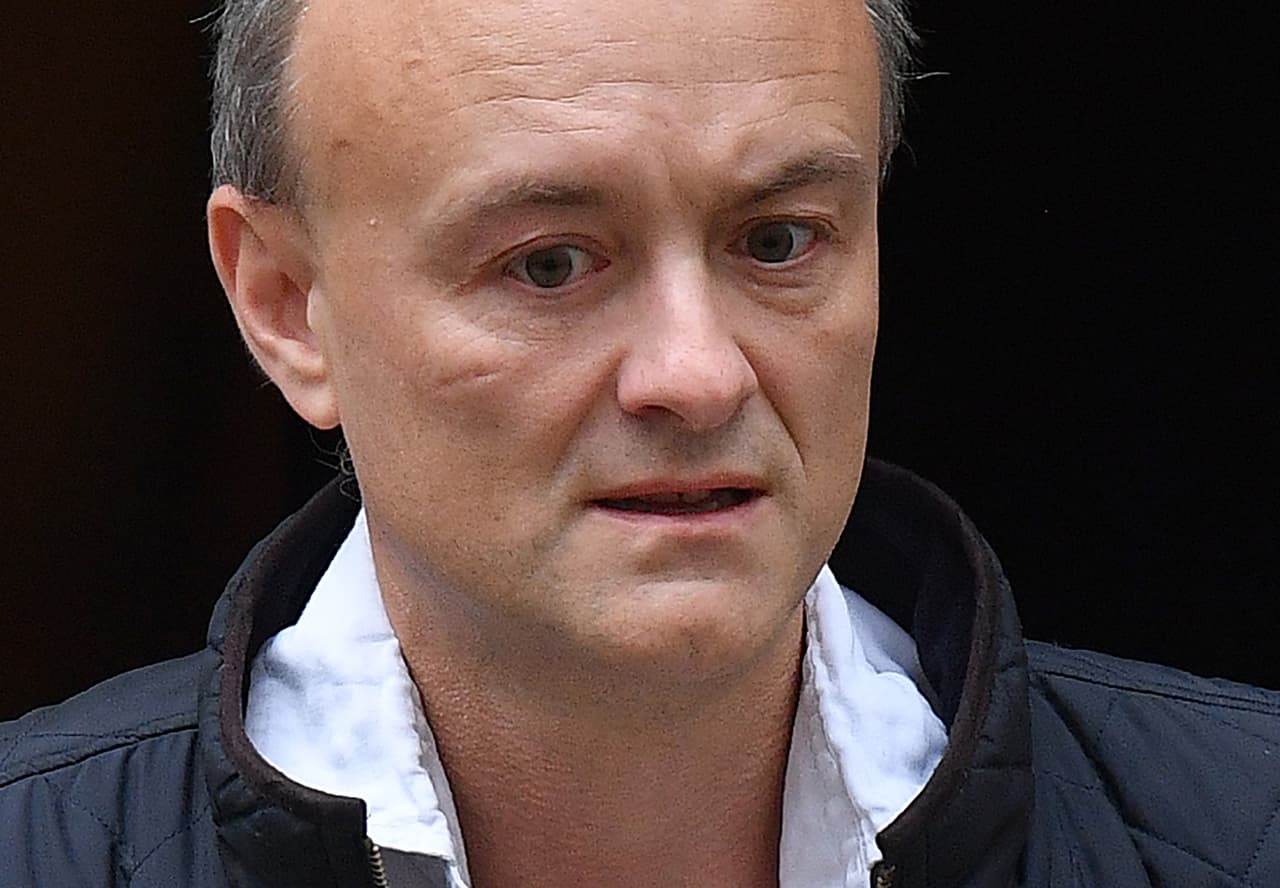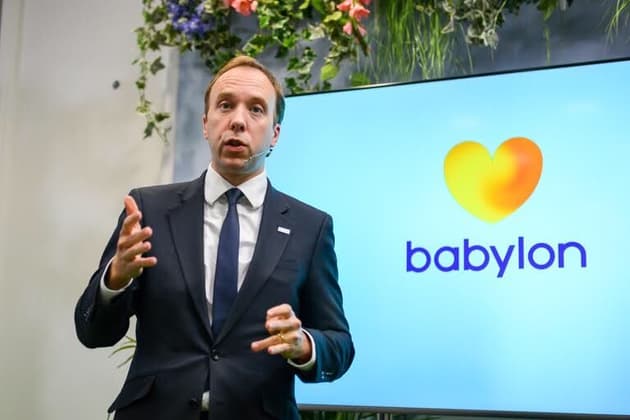
Conflict of interest questions over Cummings’ job at health tech firm
Dominic Cummings, Boris Johnson’s most senior aide, is facing conflict of interest accusations over a publicly undisclosed consultancy job at a healthcare start-up endorsed by the government and in pole position to receive cash from a £250m NHS fund.
Cummings advised Babylon Health, a controversial AI start-up, on its communications strategy and senior recruitment just months before its “GP at Hand” app was publicly backed by Matt Hancock, the health secretary, a joint investigation with The Guardian can reveal.
Cummings’ paid role with Babylon concluded in July last year but he continued to advise the company until September 2018. That month Hancock visited the company and told staff he wanted the NHS to help Babylon expand.
In August this year, shortly after Boris Johnson entered No 10 with Cummings as his top adviser, Downing Street and the Department of Health announced a new £250m fund for boosting the use of artificial intelligence for diagnoses and data analysis in the NHS. Although the money has yet to be allocated, Babylon welcomed the announcement.
There are no rules requiring special advisers to disclose previous private sector roles, but MPs said Cummings’ undisclosed advisory role raised serious questions about potential conflicts of interest.
“The links between Dominic Cummings in the heart of Downing Street, the health secretary and this AI health firm are increasingly murky and highly irresponsible," the shadow health secretary, Jonathan Ashworth, said.
“Mr Cummings’ work for this company raises serious questions about a potential conflict of interest given the firm could be in line to receive public money from this new £250m AI fund.
“We need to know if he declared his work for the firm to the cabinet secretary when he joined the government payroll.
“Cummings should come clean on any other consultancy work he did before entering Downing Street so the public can have confidence that there are no other conflict of interest issues at play.”
Sarah Wollaston, the Liberal Democrat chair of the health select committee, called for reforms to the rules governing the conduct of special advisers.
“We need greater transparency on the potential conflicts of interest for all special advisers, especially given the scale of their power and influence,” she said.
Babylon confirmed Cummings was paid via his company, Dynamic Maps Ltd, which he set up in October 2017 as the sole director.
No 10 declined to answer detailed questions about Cummings’ consultancy work, including his salary for Babylon, what other firms he had advised for and why it has not been publicly disclosed. A Downing Street spokesman said: “Special advisers act in accordance with Special Advisers’ Code and the relevant provisions of the Civil Service Code, acting with integrity, and serving the public interest. Special advisers have no role in authorising expenditure of public funds.”
Babylon already holds a contract with Hammersmith and Fulham Clinical Commissioning Group, in west London, to provide NHS GP appointments by phone and video link via its GP at Hand app. More than 50,000 people have signed up for the app, but its popularity with patients outside the area has driven up costs for the group, creating a £21.6m funding hole.
Andy Slaughter, the Labour MP for Hammersmith, said: “Babylon is an organisation which is, via its GP at Hand app, distorting and undermining the whole basis on which primary care has worked since the founding of the NHS.
“It’s not just privatisation, it is undermining the ability of local GPs to serve their patients in a sustainable way.”
The GP at Hand app has expanded into Birmingham and will launch in Manchester by early 2020.
Babylon had been repeatedly boosted by Matt Hancock, who even promised to help change rules to benefit the company. At his visit to the company in September 2018, soon after his appointment as health secretary, he told staff how much he admired their work.
 Ali Parsa and Matt Hancock at the latter's visit in September 2018
Babylon/Twitter
Ali Parsa and Matt Hancock at the latter's visit in September 2018
Babylon/Twitter
 Hancock told staff he wanted to help the company expand
Babylon/Twitter
Hancock told staff he wanted to help the company expand
Babylon/Twitter
In an accompanying Telegraph interview, Hancock praised the company and said he used the app. “GP at Hand is revolutionary,” he told the newspaper. “It works brilliantly for so many patients and goes with the grain of how people access modern services. I want to see GP at Hand available to all, not based on their postcode.”
Hancock was criticised for another endorsement of Babylon’s app in a feature sponsored by the company in the Evening Standard two months later.
Slaughter said: “It’s a scandal that [Babylon] has already received the support and protection of the health secretary. And now to learn that the prime minister’s top adviser has been paid to help the firm is deeply concerning.
“Cummings’ work for Babylon raises a clear conflict of interest given the company is in line to receive more public funds for AI.”
The app is controversial with some NHS clinicians, who are concerned it could leave conventional GP services underfunded and with only the most difficult patients. They also have concerns about the reliability of its AI for diagnosis.
Babylon is recruiting heavily, with more than 40 adverts for AI-related roles listed on its website. The company recently raised $550m (£449m) in a new funding round led by Saudi Arabia’s sovereign wealth fund, valuing it at $2 billion.
The Department of Health did not respond when asked if Matt Hancock was aware of Cummings’ role at Babylon.
Sam Smith, head of policy at the patient confidentiality campaign MedConfidential, said there was good reason to believe that a large chunk of the £250m health AI fund would go to private companies like Babylon.
“The current government has a policy that all analytics must involve private companies, so whether they’ll get the whole £250m or just most of it is a political decision,” he said. “A public option for AIs used by the NHS is necessary to ensure a competitive market.”
The controversy is the latest in a long line of conflict of interest questions that have dogged the prime minister. He is facing four inquiries over his close friendship with the US businesswoman Jennifer Arcuri, whose companies were given £126,000 in public funds.
Sir Lynton Crosby, the Conservative pollster who played a key role in several of Johnson’s electoral campaigns, has also faced past criticism for lobbying ministers over tobacco legislation on behalf of clients of his lobbying firm, C|T Partners, shortly before it was announced that he was to become an adviser to David Cameron.
Babylon Health was founded by the former Goldman Sachs banker Ali Parsa, who also co-founded and served as CEO of the private healthcare company Circle – the first private business to operate an NHS hospital.
Circle announced in 2011 it would take over the ailing Hitchingbrooke hospital, only to withdraw from the ten-year deal early in 2015, after Parsa had stepped down as the company’s chief executive in 2012. The deal was criticised in a scathing parliamentary report that slammed its “unachievable” cost savings and “poor and inadequate” oversight.
In a statement, Babylon stressed that Cummings’ role had been a “very short piece of one-off consultancy to draft a communications strategy”, with ten days worked in total, ending in July 2018. However, when pushed, the company admitted he had done some informal work beyond that date, including advising on the appointment process for a communications director in September that year.
The company added: “Babylon helps the NHS by reducing A&E visits by 3.8% (4,560 fewer visits per year at our current size) — and at no extra cost to the NHS. Our symptom checker tool has been used over 1.5 million times and no patient has ever reported a serious problem.”
On the government’s new £250m fund, it said: “Governments around the world are investing in AI and it’s brilliant that the UK government is following suit.”
Header image: Dominic Cummings outside No 10 Credit: Getty Images




